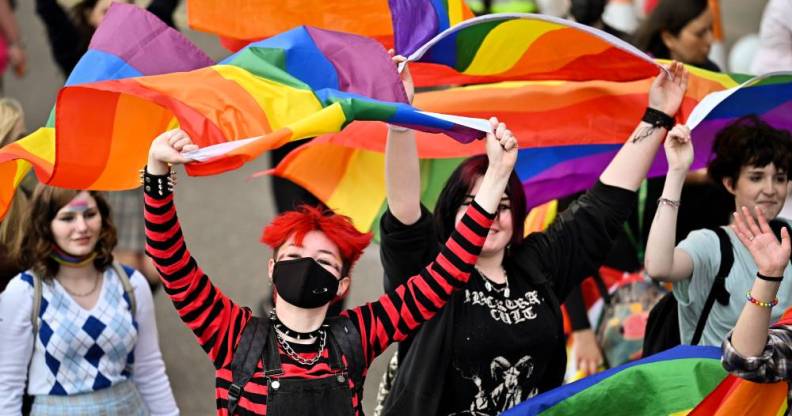Young queer people feel less happy in Scotland than they did five years ago, research finds

LGBT Youth Scotland research found that the number of young queer people who consider Scotland a good place to live has decreased over the past five years. (Getty/Jeff J Mitchell)
The number of LGBT+ youth in Scotland who consider the country a good place to live has dropped over the past five years, according to research.
The findings were published in LGBT Youth Scotland’s “Life in Scotland” report, and it analysed the responses of 1,279 people aged between 13 and 25 in the country. The survey, which was first developed in 2007, is undertaken every five years and is funded by the Scottish government.
The research found that only 65 per cent of participants thought the country was a “good place for LGBTI young people to live” in 2022. This was a sharp decrease from the 81 per cent of young people who said the same thing five years ago, and it was the “first time in 15 years” that the number began to drop.
Just 39 per cent of the participants believed their local area was a good place for LGBT+ youth to live in 2022. However, there was a stark difference between those living in rural and more urbanised areas.
Over three in 10 (62 per cent) of LGBT+ young people living in urban areas thought their area was a good place to live, and only 36 per cent of those living in suburban areas said the same. This fell to only 28 per cent for LGBT+ young people living in rural areas of Scotland.
LGBT Youth Scotland chief executive Dr Mhairi Crawford described how the report offered an insight into how “things are getting worse for LGBT young people in Scotland” across “most areas” of life.
“It is important that young people feel valued and listened to and are supported to be the best and honest self,” Crawford said. “Doing so allows them to thrive and survive.”
She added: “However, for too many LGBT young people they experience high levels of bullying, poorer mental health and other inequalities.”
The report found there has been a sharp rise in LGBT+ young people who believe that homophobia, transphobia and biphobia are a “big problem” in Scotland.
In 2017, 11 per cent of young people said that homophobia was a big issue in the country. This rose to 25 per cent in 2022.
During the same period, those who thought that transphobia is a “big problem” in Scotland increased from 49 per cent in 2017 to 69 per cent in 2022.
About 18 per cent of young people living in Scotland thought biphobia was a “big problem” in 2017, compared to 21 per cent in 2022.
Only 10 per cent of young people said the experience of school for LGBT+ people in Scotland was “good” in 2022. Just over half (58 per cent) of bisexual young people and 70 per cent of gay and lesbian participants reported experiencing biphobic or homophobic bullying at school.
According to the report, 57 per cent of trans students in Scotland said they had experienced transphobic bullying at school.
On the back of the report, Scottish minister for equalities Christina McKelvie promised that the government will “work to address” the “serious concerns” highlighted in the report.
“This report is a sobering reminder that although we have made significant steps towards achieving a more equal society in Scotland for LGBTI people, we cannot ever be complacent,” McKelvie said.
“We must continue to work hard to make sure that Scotland is a place where young people feel proud to be themselves and where no one is denied rights or opportunities because of their gender identity or sexual orientation.”

